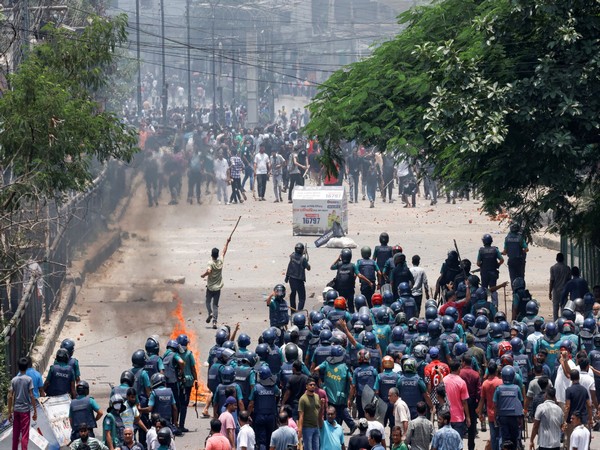Dhaka: wo years ago, the people of Bangladesh were jubilant when their per capita income surpassed that of India. Today, that economic dream lies shattered.
Protests, hartals and large-scale vandalism of public and private property in the last one month or so, have ensured that economic growth will take a hit. Peaceful protests are fine, but violence on the streets can only impact the state of the economy and livelihood of people. Recall that Bangladesh's US$450 billion economy undoubtedly expanded under Sheikh Hasina as the garments sector grew.
However, the flip side is that economic growth and development alone could not keep Prime Minister Sheikh Hasina from being booted out of office. Even here it must be said that economic development came at a price as costly imports, inflation, unemployment and shrinking foreign exchange reserves pushed Bangladesh to seek a US$ 4.7 billion IMF loan.The ratings agency S&P summed it up well recently by stating that,"The protests...have exacerbated downside risks to economic growth, fiscal performance, and external metrics."
Thus, a difficult economic situation has now become even more complex because of the massive anti-quota protests which have brought the economy to a grounding halt. At the end of July 2024, Bangladesh’s economy reportedly suffered losses totalling US$1.2 billion. Economic losses caused by political instabilitywill not be immediately apparent, but some short-term issues can be flagged.
One issue of immediate concern to the interim government will be the collapse of supply chains which has led to a reduction in the supply of goods to the retail market, resulting in a hike in the price of goods. Inflationary pressure is therefore bound to rise further.On 29 July, the Foreign Investors' Chamber of Commerce and Industry (FICCI) said that recent unrest had “significantly impacted Bangladesh's economy with over $10 billion” and expected that losses would increase.
FICCI estimates that the consumer goods industry would face a setback of over US$ 100 million.
The country’s Budget, which was passed on 30 June, targeted an inflation rate of 6% and GDP growth rate of 6.75%. To balance the budget spending was also cut. In late June, the country received $1.15 billion from the IMF, which was the third instalment of an approved loan package of $4.7 billion.
All this will now require recalibration as economic growth will be hit in the short-term.
Immediately, losses caused by damage to public and private property by rioters will cost the exchequer heavily and are estimated to be in the range of several thousand crore taka. Essentially, livelihoods have been impacted and every single business, small or big is feeling the loss. The loss of income and production will make its impact felt in the medium term.
Bangladesh’s readymade garments industry which was the crowning glory of the economy has taken a hit and will recover slowly, because assets and exports have both been hit. This sector, which is the cornerstone of Bangladesh's economy, comprises 84% of export earnings.
Pertinently, exports increased from US$ 14.6 billion in 2011 to US$ 33.1 billion in 2019. Estimates are that the sector has lost US$ 4 billion due to the protests and ensuing violence. While the sector will recover, it remains vulnerable to global market volatility due to its focus on low-cost garments. The complete halt of economic activity for over a month has damaged major trade supply chains based on export and import of goods.
Additionally, a surge in the import of machinery and equipment to set right the loss of various public and private properties is expected which will require the government to spend scarce foreign exchange.
There is little doubt that Bangladesh will experience a slow-down in inward flow of remittances in the coming months due to the adverse impact on exports and worker’s outflow. With the forex reserve under stress it is assessed that the Bangladeshi Taka could weaken against the US dollar, with imports becoming costlier.
The Bangladesh Association of Software and Information Services estimates that the loss to the IT industry is approximately Taka 400 crore. Collapse of internet-based communications has caused damage to consumer confidence. Unfortunately, the failure to provide even minimum online backup for communications with the outside world has damaged business and investor confidence.
Recall that underlying the ongoing protests is the challenge of high unemployment in Bangladesh. The youth protests were set off by by the job quota system that reserved 30% of government jobs for families of 1971 war veterans. Protesters demanded abolishment of the quota and wanted it replaced by a merit-based system.
That being said, officials statistics show that during the first quarter of 2024, the unemployment rate surged by 3.51% compared to the last quarter of 2023. There are now said to be around 2,40,000new unemployed individuals. The Dhaka Tribune reported (May 2024) that the number of unemployed stood at 2.59 million, up from 2.35 million in the preceding quarter.
The restoration of the economy from such a crisis, which is really man-made, depends not only on adequate financial support, economic incentives and benefits, but also in political action against extremists involved in the arson and vandalism of public and private properties.
Bangladesh is an important economic player in the global market, not only as a garment manufacturer but also as an energy importer. It also has big infrastructure investments from several countries including China and Japan. It is therefore, necessary that investor confidence is restored at the earliest.
S&P correctly forecasts that, "The damage to credit metrics may be contained if the socio-political situation normalizes soon and Bangladesh forms a new government." It remains to be seen as to how quickly the interim government can restore economic confidence. Unless Bangladesh returns to normalcy very soon, which seems unlikely in the current situation, overall macroeconomic performance will be impacted.
